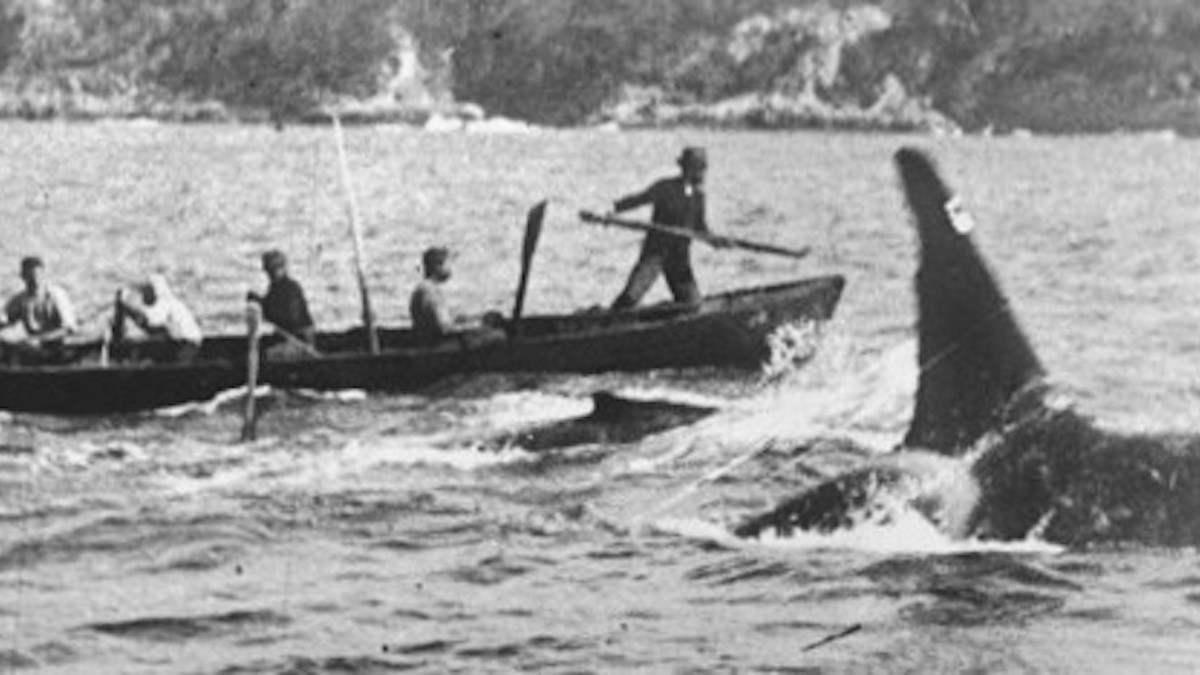
For centuries, hunters have waxed poetic about their hunting dogs, from pointers to retrievers to coursers and hounds. But imagine hunting the world’s largest prey from a small boat, with the assistance of a pod of killer whales, each weighing several tons and longer than a small bus.
That is the story of theKillers of Eden, a pod of orcas that shared cooperative hunting strategies with humans off the coast of Australia. While it sounds like a mash-up between Nature is Metal andFree Willy, the phenomenon was recorded, photographed and, more recently, subjected to DNA investigation.
Twofold Bay is on the southern coast of Australia, near the town of Eden. Before white settlement, the local Aboriginal people took their sustenance from the ocean for tens of thousands of years.
Those indigenous people had an ancient relationship with the sea, which included a belief that orcas embodied the spirits of their ancestors. Somewhere in the depths of time, the Indigenous Australians developed a symbiotic relationship with orcas. When larger baleen whales such as humpbacks were in the vicinity, orcas would splash their tails and spy hop, catching the notice of indigenous hunters.
These brave souls would paddle into the ocean and follow the orca pod to the baleen whales, where they would kill the larger whales with harpoons. Once a whale was slain, the human hunters would flay the carcass and share the spoils with their orca co-conspirators.
Orcas are among Earth’s super predators, with massive toothed jaws and the ability to swim 35 miles per hour. Most important, however, is the keen intelligence they developed from hunting in groups. While not commonly considered dangerous to people, orcas commonly hunt other enormous oceanic creatures, including great white sharks and blue whales. Local orca populations are known to develop distinct cultures like specializing in a favorite prey or using tactics passed by generations. One pod recently made headlines for repeatedlysinking yachts.
When white settlers set up a whaling base in Twofold Bay around 1850, they were quick to exploit the ancient relationship between people and orcas. Whaling ships began to follow the orcas as well, leaving bits of their massive kills as a reward.
While aboriginal hunters killed for food, white whalers sought to kill baleen whales for the international trade in whale oil. Before electricity was widespread, whale oil was a highly valuable commodity, sending enterprising whalers to scour the ends of the Earth. Even though early commercial whalers used only sailboats and small rowboats, they drove whale populations to near extinction across entire oceans. This trend continued as whaling technology developed.
Remarkably, the so-called Killers of Eden orca pod persisted into the modern era. Whalers and an old male orca namedOld Tomwere even captured in motion film, although that film was evidently lost over time. Orcas can live up to 90 years. Old Tom died in 1930, but his skeleton remains on display at a museum in Eden. Just this year,scientists used the skeleton of Old Tom to identify the genome of the local populationof orcas that lived alongside human hunters off Australia’s coast.
While the story of the Killers of Eden is remarkable, it’s not entirely unique. Even today, there arecommercial fishermen off the coast of Brazil that team up with wild dolphinsto capture fish. The dolphins, with their sonar-like echolocation, can identify schools of target fish even in murky waters. Fishermen, on the other hand, benefit dolphins with their nets by dispersing larger schools of fish into smaller groups, where they are more vulnerable.Cooperative human-dolphinfishing has been documented around the world.
Orcas, after all, are essentially dolphins' very large, very smart cousin. And like dogs, orcas have delighted human hunters with their superhuman ears and noses and their playful eagerness. Imagine if your bird dogs had sonar.
Shop
Sign In or Create a Free Account
Related

Wildlife Management
Should Hunters Be Concerned About Deer with COVID-19?

Wildlife Management
The Killers of Eden



